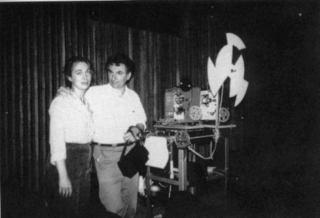Ken Jacobs Retrospective Tour
Date: 13 October 2000 | Season: Ken Jacobs Nervous System
KEN JACOBS RETROSPECTIVE
UK Touring Programme
13 October – 14 December 2000
To accompany the first ever British performances of the amazing Nervous System projections, a three programme retrospective of work by Ken Jacobs, a leading innovator of avant-garde film for the past 40 years.
After making his first films in the late 1950s, Jacobs was at the forefront of the experimental film movement which exploded in New York and across the world throughout the next decade, liberating cinema from its previous restrictions and conventions. The earliest film presented here, The Whirled (1956-61)”, features Jack Smith in a series of vignettes from the period which also yielded the better known and highly influential Little Stabs At Happiness (1958-60) and Blonde Cobra (1959-63), two films considered revolutionary for the way they displayed an entire new cinematic sensibility. Blonde Cobra was particularly radical, containing long scenes of black leader and a soundtrack that incorporates live radio, making no two projections the same.
“Window” (1964) and “Airshaft” (1967) were also unique, showing Jacobs refining his talent for investigating space, an approach rooted in his schooling by abstract expressionist painter Hans Hoffman. With these films Jacobs anticipated the Structural movement, which subsequently became the dominant style of the avant-garde throughout the 1970s, being particularly prevalent among the new English filmmakers.
In 1969, Jacobs made Tom, Tom The Piper’s Son, a 2 hour tour-de-force constructed by re-photographing and dissecting a 10 minute short made by Billy Bitzer in 1905. After presenting the original film, Jacobs pursues a deep analysis into its visual elements; slowing down, freezing action and examining small, abstracted areas of the frame. The film becomes a treatise on composition, an art lesson unfolding before our eyes. Free of narrative, the action becomes the drama. That same year, the filmmaker began to investigate the effects of the Pulfrich pendulum method, in which moving images are given a strong 3D depth. Seen through a Pulfrich filter, the tracking shot of a snowbound suburban housing estate in Globe (1969) becomes an immense vista of shifting planes, tectonic vision of the highest order. The later film Opening The Nineteenth Century: 1896 (1990) re-presents Lumiere footage to similar effect.
The innovation of these works, and experiences directing live action shadow plays, led to the Nervous System, a live projection technique using two specially adapted projectors. Since 1975, Jacobs has developed numerous works that use two identical filmstrips to produce unimagined illusions of depth and perception. Expanding on Muybridge, Marey and the theories of early film, Jacobs unlocks the unknown possibilities hidden deep within cinema, the depth of composition that is usually lost in the unretarded flurry of frames. The Nervous System will receive their British premiere in November at the London Film Festival and selected venues across England.
During his time realising this complex projection set-up, Jacobs continued to investigate other ways of recycling images, calling for “a Museum of Found Footage … a shit-museum of telling discards accessible to all talented viewers/auditors. A wilderness haven salvaged from Entertainment”. His Urban Peasants (1975) marries pre-war home movie footage shot by his wife’s Aunt Stella with a recording of “How To Speak Yiddish”. Perfect Film (1986) presents rushes from TV news footage following the assassination of Malcolm X. The film’s structure fits perfectly alongside his other work, though surprisingly the filmmaker claims to have found the reel in a rubbish bin and considered it “perfect” in its untouched state. In 1978, Jacobs and his students sequentially re-edited The Doctor’s Dream, a bland 1950s television drama to expose an unexpected subtext lurking between gaps in the narrative. His latest films Disorient Express and Georgetown Loop use wide-screen 35mm (by mirror printing standard 16mm) to create abstracted Rorschach images of archival train journeys.
Mark Webber
Film retrospective programmes screening at Leeds International Film Festival (13 & 14 October 2000), Brighton Cinematheque (2 November 2000), Glasgow Film Theatre (7 & 9 October 2000), Hull Screen (30 November & 14 December 2000), Manchester Cornerhouse (4 & 11 December 2000), London Lux Centre (6 & 7 December 2000), Sheffield Showroom (12 December 2000).
Live performances at London Film Festival (3 & 4 November 2000), London Lux Centre (5 November 2000), Oxford Phoenix Picture House (7 November 2000), Manchester Cornerhouse (9 November 2000), Nottingham Broadway (10 November 2000).
Ken Jacobs’ Film Retrospective is a BFI Touring Programme funded by the Arts Council of England and supported by the 44th Regus London Film Festival and Lux Distribution. The season was curated by Mark Webber.
Thank you Sandra Hebron, Tricia Tuttle, Helen De Witt, Emma Heddich, Catharine Des Forges, Joanna Denham, Ben Cook, Ken and Florence Jacobs.
